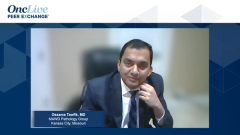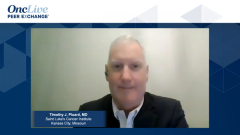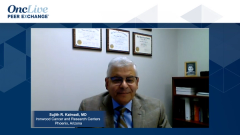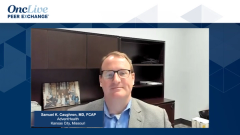
Role of a Pharmacist in Developing Treatment Pathways and Educating Patients
Ryan Haumschild, PharmD, MS, MBA, reflects on how oncologic pharmacists can help to develop treatment pathways and educate patients on precision medicine.
Episodes in this series

Transcript:
Ryan Haumschild, PharmD, MS, MBA: Pharmacists are taking on more and more roles throughout our clinics, within our patient populations, and being a key member of the provider team. One of the areas that they're emerging in with their participation is treatment pathways. This is in order to set development. More and more, we're developing tumor boards and disease-state working groups that bring into consideration many different providers, both academic subspecialists that practice in a unique area that are usually the primary investigators in a number of clinical trials, and also community providers both in the hematology and oncology space who are treating a variety of different disease states.
One of the most important things we've recognized is having some type of treatment standardization. That not only involves the medications that we choose by stage, by line of therapy and indication, but also the precision medicine pathways that complement the correct selection of treatment. Depending on which disease state pharmacists are most associated with – multiple myeloma, breast, colorectal, or non–small cell lung cancer – they start to play an important role of developing these precision medicine panels within the pathways that already exist for treatment to make sure they're complementary. We want to make sure that a patient has been screened for EGFR before we start them on a checkpoint inhibitor, because, ultimately, if we start them on another therapy and then later realize they're EGFR-positive, it's going to be tough to switch that patient over. It might be confusing to the patient as well. So, that's where pharmacists come into play with making sure those panels are built out appropriately in the electronic medical record while making sure they're complementary of the treatment sequencing so that the disease-state working group and tumor board decision is best practice. Ultimately, this is to make sure that we have a good match of precision medicine of treatment to gain approval from our payor colleagues and gain timely and equitable access.
Our pharmacists also play an important role around education, because for a lot of people, precision medicine may not be something they're very familiar with. It continues to emerge across many different disease states. It's both the oral oncolytics and self-injectables that would be filled through a traditional specialty pharmacy, also an infusion center. Lastly, an in-patient phase of care is important. So, the more everyone is aware of the latest targets and treatments, the sooner we can provide more of a consistent approach. That involves pharmacists getting involved in part of tumor boards and educating them around new biomarkers that might be extremely relevant. For example, questions like, what does HER2-low mean for a patient population and how can we better identify that sooner? What are certain targets that are most appropriate for ovarian patients regarding BRCA status or HRD? How can we leverage that information for appropriate treatment selection?
Lastly, to our nursing colleagues that interact with these patients on a daily basis, pharmacists can be a part of their educational grand rounds and also provide them the latest information that allows them to have effective conversations with the patients that they're serving, in addition to our expert providers in clinic that are helping guide therapy selection in the ultimate care plan for our patient.
Transcript edited for clarity.








































